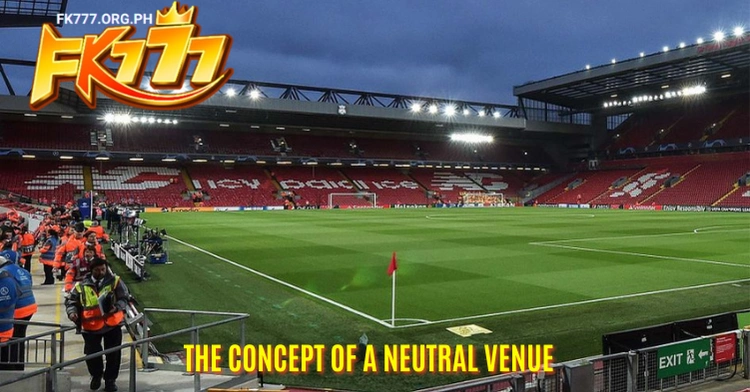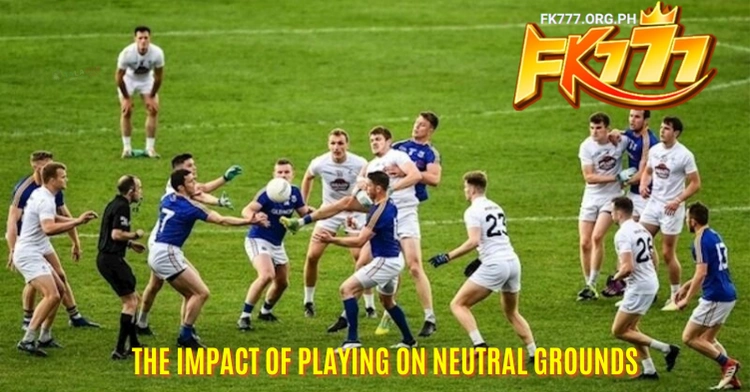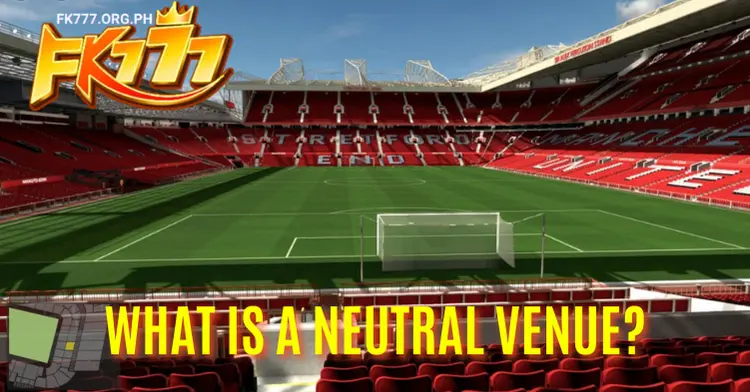For those who have watched football for some time, a neutral venue is not that new. This is aimed at making grounds fair, transparent, and in adherence with the regulations with an assurance to safety and security for both fans and players; let us thereby learn what a neutral venue is all about from a summary of FK777 in the following article below.
Understanding the Concept of a Neutral Venue
A neutral venue refers to a location that does not belong to either of the competing teams. Depending on the nature of the tournament or specific requirements, matches may be held at such venues instead of home grounds.
The primary condition for selecting a neutral venue is that the distance to the venue should be equal for both teams, ensuring absolute fairness. This minimizes any potential advantages one team might gain from playing on home soil.

When Are Neutral Venues Necessary?
In most instances, neutral venues are a reality in professional football. Here is why they are applied in some competitions:
Inadequate Facilities from the Home Team
One common reason for resorting to neutral venues is when the designated home team cannot meet infrastructure requirements. If a team lacks proper equipment, facilities, or resources, the organizing committee may decide to relocate the match while ensuring the event’s official schedule remains unchanged.
Neutral venues are also used in situations such as:
- The home team’s stadium fails to meet safety or organizational standards.
- Previous misconduct by the home team or their supporters.
Penalties for Serious Misconduct by the Home Team
A home team may be banned from hosting their next match due to significant misconduct, such as:
- Fans engaging in hooliganism (e.g., lighting flares, inciting fights, or damaging stadium property).
- Behavior that endangers the safety of players, officials, or spectators.
The term hooliganism refers to extreme actions that pose risks and may impact the fairness and safety of the match.
Historical Case: Misconduct in Philippine Football
In Philippine football history, there have been instances where inappropriate behavior by opposing fans led to official sanctions. One notable case involved a friendly match between the Philippine national team and Hong Kong.
In this match, the Hong Kong supporters became so violent and racist against Philippine players and their fans. The PFF filed a formal complaint; thus, an investigation by FIFA ensued. In return, FIFA imposed penalties on the Hong Kong Football Association for their supporter’s actions.
The decision underlined FIFA’s commitment to taking strict action against anti-discrimination policies in football, wherever and whenever these incidences might happen.
Although the Philippine team was not penalized in this incident, it underscored the importance of maintaining respectful conduct among supporters to avoid negative consequences for the home team.
The Impact of Playing on Neutral Grounds
If you have just read this for the first time, you may wonder how playing on neutral ground affects football teams. It is not a penalty or failing to meet the physical conditions but involves several factors:
Reduced Ticket Sales
As you may know, football match revenues come foremost from ticket sales; whenever teams play in their home arenas, fans from all over the country can come to cheer them on, which improves attendance and boosts morale.
On neutral grounds, the travel distance for both teams is usually the same. This makes it difficult for fans to come and support their players in person.
Less Enthusiastic Player Morale
The larger the crowd of fans in the stadium, the more enthusiastic and energetic the atmosphere becomes. When competing in an official match, players greatly benefit from the passionate cheers of supporters, which can enhance their fighting spirit.
There have been many matches where the unyielding support of football fans has pushed players to give their all until the final moments, even turning the tide of the game.

Economic Disadvantages
Actually, for those who may not know, holding matches in one’s own country comes with a lot of benefits: visitors can help boost the economy through accommodation rentals, dining, wellness facilities, and many other ways; it is also a form of cultural exchange and allows one to share one’s culture with international friends.
Impact on Game Quality and Player Health
According to experts familiar with European odds, traveling to different locations can affect players’ health due to time zone differences and weather conditions. This can take a toll on their physical fitness and their ability to perform at their best on the field, reducing the chances of delivering flawless plays that leave fans in awe.
Conclusion
Neutral venues play a crucial role in upholding fairness and order in football. By ensuring teams compete under equal conditions and addressing misconduct effectively, such measures contribute to the integrity of the sport.
The above covers everything related to neutral grounds in professional football and the reasons they might be implemented. If you have any questions, feel free to leave them in the comments below!
Read more: Handicap 1 Goal Betting at FK777: Effective Winning Tips
Hello, I’m Miguel Santos 🎯, the CEO here at FK777 Casino 🎰. Having acquired years of experience in online gaming 🎮, I have always believed in creating a platform for players that is superior ⭐ and safe for gameplay 🛡️. My mission is to combine innovation 💡 with integrity 🤝, ensuring FK777 stands out as a trusted and enjoyable destination for gaming enthusiasts 🌟.


